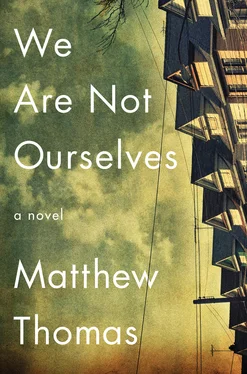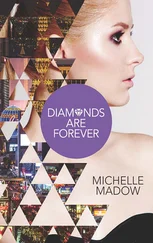“I couldn’t find you,” he said sharply.
“I realize that, honey. But you’re here now.”
“I was looking all over for you.”
“Ed,” she said. “I’m here. You’re here. Enjoy the game.”
The boys were too caught up in the food to notice Ed. He still hadn’t taken his seat but was standing looking into the crowd as if the answer to what confounded him were projected on the backs of their heads. Farshid listlessly fingered a waxy-looking pretzel. Connell wolfed down a hot dog in two bites and started in on his own pretzel. When she picked up on annoyance behind her, she tugged on Ed’s sleeve and he fell into the seat and began to smooth out his pants with an insistent repetitiveness, as though trying to warm himself or clear crumbs from his lap. He had bought nothing for the two of them to eat.
“Where’s the food for us?”
“I didn’t get us anything.”
She shook her head in disbelief. “What are we going to eat?”
“You didn’t ask for anything.”
“I have to ask to eat now?” She took a piece of Connell’s pretzel.
“Hang on,” he said. A hot dog salesman had entered their section, and Ed flagged him down.
“I feel like you don’t think anymore,” she said when they were settled in with their dogs. “I need you to get with it, Ed.”
“Let’s just enjoy the game,” he said.
A couple of innings later, a Met lifted a high foul ball toward their section. She could feel it gaining on them. As it approached, time seemed to slow; an awful expectancy built. It shifted in the wind, so that it appeared to be headed elsewhere; then it was upon them. People all around reached for it, but it was headed right for Ed. He stabbed at it clumsily and it bounded out of his hand, snagged by a man behind them in the ensuing scrum.
For a moment, Connell appeared stunned. He had been brushed on the neck by the hand of destiny. His body seemed to shiver with contained nervous energy, and he hopped like a bead of oil in a saucepan.
“Wow!” he said, to her, to his father, to Farshid, to anyone who would listen. “Can you believe it?”
The victorious fan stared into empty space with a determined expression as he received the forceful backslaps of his friends. His studied lack of fanfare had the effect of holding the note of his triumph longer.
Ed was miserable. “I’m sorry, buddy,” he said. “I tried to get it for you.”
“No problem, Dad.”
“I’m really sorry.” He looked bereft. “I feel terrible.”
“Maybe if you’d had a glove,” Connell said sweetly, extending his own. Ed turned and asked if the boy could see the ball, which the man handed over more warily than Eileen thought appropriate. Connell held it covetously. She worried that he might ask to keep it, but after a few moments in which he seemed to communicate wordlessly with it, he gave it back, and the man secreted it into his jacket pocket. Something about these talismanic objects, spoils of an ersatz war, reduced men to primal feelings. Connell pounded his glove every time a foul ball was hit in their general direction, no matter how far away it was, and she could think of nothing to say to stop him.
She sat beside Connell on the top step, wondering about all the fuss people made over the constellations. The webs of light poorly described the forms they were meant to evoke, and even if she’d known what those forms were, she doubted she could have suspended her disbelief enough to see them characterized there.
On an average night the stars glimmered weakly, if they were visible at all, but that night they were unusually prominent. This was another reason to move — maybe in the suburbs he could see the stars well all the time.
“What do you see?” she asked.
“A lot of stars,” he said. “What about you?”
“There’s the Big Dipper,” she said.
“And the Little Dipper.”
“Yes.”
“And the North Star.”
“Yup.”
They had come to the limit of their knowledge. She was relieved to have a son who didn’t spew forth a stream of facts about the sky when he looked up at it. One fear in marrying a scientist had been that her children would be ill-equipped to live in the world of ordinary men.
“I like to imagine people thousands of years ago looking at the same stars,” he said.
She smiled at his philosophical tone.
“And people in the future long after we’re dead,” he said.
A shudder came over her. She was the one who was supposed to put it into perspective for him, not the other way around. She had lived through the loss of two parents and witnessed death nearly every day at work, and yet she was spooked to hear him invoke their inevitable finality.
“Come inside,” she said. “It’s late.”
“I want to see if the stars get brighter the later it gets.”
“It’s a school night.” She felt her grip on her temper begin to slip. The males in her life refused to cooperate with her. “You can investigate this in the summer.”
She stood in the hallway watching him trudge to his room. Then she found herself stepping back onto the stoop and looking again to the night sky, trying to divine what ancient people might have seen in it — animals, hunters, maybe kings. Nothing came into focus, except when she thought she saw a dog with a long leash around its neck. When she looked up again it was gone.
That night, when she couldn’t sleep, she concentrated on the steadiness of the stars, their transcendence of human sorrow and confusion, the reassurance offered by the unfathomable scale of geologic time.
On Sundays, they went to one o’clock Mass. Ed was never the driving force in their church attendance. When Connell was a baby, Ed had loved to usher him out the back of the church at the first hint of a meltdown.
For someone whose responsibility it was to get everyone to Mass, she didn’t feel confident of her own belief in God anymore. It had been years since she’d thought of the world as the product of a divine plan. Maybe working as a nurse was too much for belief to fight against. She’d seen people expire on the table in every way — noisily, quietly, thrashingly, completely still. Death had come to seem no more than the breaking down of an organism: the last exhalations of the lungs, the final pumpings of the heart, the brain deprived of blood.
That didn’t mean she was going to stop going to Mass. She liked the moral lessons for the boy, and the good works the Church did were the most important reason to attend — God or no God. When alone with her thoughts she couldn’t help detecting some frequency she was tuning into, and she prayed to that frequency after communion when she knelt alongside her pew mates, though most of the time she felt like she was talking to herself.
The previous Sunday, Pentecost Sunday, at the end of the last Mass he would celebrate at the parish, Father Finnegan, who had been there thirty years, had introduced his replacement, Father Choudhary. Everyone registered the new, dark figure up there preparing the gifts as a harbinger of the future. Over the last decade, the priests had gone from being mostly Irish to mostly Hispanic; now, apparently, they were coming from India too.
Every year, there were more Indians around her at church. A few months ago, an Indian family had bought the Wohls’ house up the block, and because she’d assumed they were Hindu, she’d been surprised to see them at Mass the following week. She’d lingered a bit so she wouldn’t have to walk down the block with them, something she hadn’t been proud of when she lay in bed thinking of it that night. The next Sunday, she made sure to catch them on the way out and walk with them. It had felt good to make amends for a slight no one knew she’d committed, and thereafter she felt comfortable letting them walk home alone.
Читать дальше
Конец ознакомительного отрывка
Купить книгу












